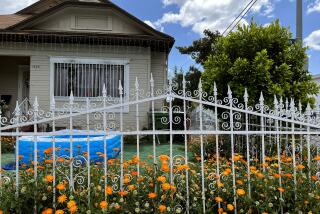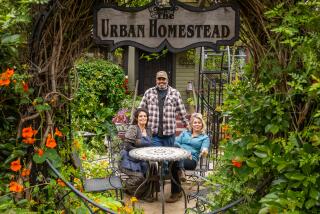Suburban living, down on the farm
- Share via
Terry Eski had been itching to grow her own food for years, but living in a Chicago condominium, she lacked the space to garden.
Until 2009, that is, when Eski, her husband and two children moved north to Prairie Crossing, a master-planned farm community in the suburb of Grayslake, Ill. There, she lives across the street from a 100-acre organic farm, has access to a community garden and spends Saturdays collecting fresh-laid eggs.
FOR THE RECORD:
Farm communities: In an article in the Nov. 29 Section A on new home developments built around organic farms, the first name of Daron Joffe, who has helped design farm developments, was incorrectly given as Devon. —
FOR THE RECORD:
Farm communities: In an article in the Nov. 29 Section A on new home developments built around organic farms, the name of homeowner Tracy Erski was given as Terry Eski. —
Founded in 1992, Prairie Crossing is one of the first of a growing number of new housing developments built around a functioning organic farm. The developments offer farm living without the farm hassle. Homeowners don’t work on the farm, but still enjoy access to fresh produce, miles of walking trails and acres of open space.
Devon Joffe, who has helped design residential farms across the country, said the idea of building homes and farms together “is as much a really old concept as it is a new one.”
Their emergence has banked on the growing demand for locally grown food and a changing outlook by some homeowners on what an upscale community should offer.
“People are willing to pay more for a smaller lot, because the lot comes with a 100-acre farm and 300 acres of forest or green space,” said Ed McMahon, a senior fellow with the Urban Land Institute in Washington.
“Agriculture is the new golf,” he said.
Just outside Atlanta, Serenbe Farms is a 1,000-acre, 100-family farm development founded by Steve and Marie Nygren, who retired from the Atlanta restaurant scene and moved to the countryside.
“We started looking and researching about how you can both develop and save the land,” Steve Nygren said.
Seventy percent of the subdivision is greenspace, including 25 acres reserved for an organic farm. This year, the 5 acres under cultivation yielded 56,000 pounds of produce.
Produce is distributed to residents who buy shares in the development’s farm. Some of the harvest is sold at the Saturday farmers market or to local restaurants.
The development is hardly rustic. Serenbe’s modern homes start at $265,000 for 900-square-foot cottages and range up to $500,000 for homes as large as 6,500 square feet.
Still, every effort is made to capture a bit of an old-country farming town. At Serenbe, even the landscaping is edible. Banks of blueberry and fig bushes line sidewalks, and pecan and peach trees sprout from street medians.
“When kids grow up seeing their food grown, it changes their entire attitude,” Nygren said. “If you grow up knowing what a fresh blueberry tastes like, you’re not going to settle for stuff that’s picked green and shipped.”
Some residents say it helps foster a small-town feel. “I knew more people by their first name in the first three months I lived here than in the entire 11 years I spent in my neighborhood in Atlanta,” said Shelton Stanfill, a five-year Serenbe resident.
He still drives the 40 minutes into Atlanta at least once a month to stock up on groceries and items not available at Serenbe. And “if you want to go hear a great orchestra, you’ve still got to make the commute,” he said.
In most farm communities, residents don’t own the farm. Land is leased to professional farmers and managed by a land trust or, in the case of Prairie Crossing and Serenbe, an independently run institute.
At Bundoran Farms, a development covering 2,300 acres of Virginia forest outside Charlottesville, residents own their parcels of land but relinquish their rights to develop it. A committee of homeowners, agriculture professionals and forestry experts makes decisions regarding land use, and then leases the farming rights to professional operators.
Bundoran supports 175 acres of apple orchards and cattle pastures. A 40-acre vineyard will open next year.
“You can own a farm, and know that it will be taken care of in a professional way, but you don’t have to own a tractor,” said David Hamilton, the project manager at Bundoran.
More to Read
Inside the business of entertainment
The Wide Shot brings you news, analysis and insights on everything from streaming wars to production — and what it all means for the future.
You may occasionally receive promotional content from the Los Angeles Times.









